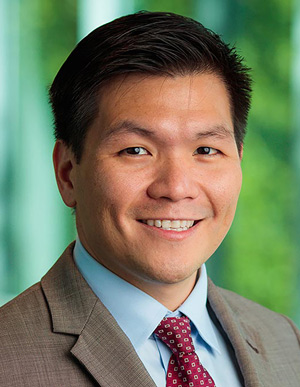 Jun Amora
Jun Amora
Vice President, Enterprise Supply Chain Services
Geisinger, Danville, Pennsylvania
About Jun Amora:
As an undergrad at the University of Washington in Seattle, Jun Amora worked in a lab at Seattle Children’s Hospital studying DNA binding proteins. He enjoyed the work and saw it as a steppingstone to medical school. But after graduation, he decided to defer medical school and work in healthcare operations for awhile. So at age 19, he started work as an inpatient unit secretary at Seattle Children’s. He enjoyed the exposure to operations, and after shadowing doctors on their rounds, he learned something about himself: Direct patient care wasn’t for him. Still, he sought a healthcare career that would satisfy his intellectual curiosity and love of problem-solving.
One day, browsing through the hospital’s intranet, he came across a blog by Pat Hagan, chief operations officer, who wrote about the need for experienced healthcare leaders to mentor the next generation. “I thought maybe he could be my mentor,” says Amora, “so I sent him an email. He wrote back and told me he’d love to meet with me.” Hagan opened Amora’s eyes to the world of lean process improvement. Soon after, Amora joined Seattle Children’s Continuous Performance Improvement team as an internal consultant.
“As consultants, we worked on a variety of projects across different departments,” he says. “I happened to be assigned to a project to deploy a 2 bin kanban system throughout the hospital. This was my first exposure to healthcare supply chain, and it taught me many lessons around change management, transformation, standard work and the financial impact of a properly designed operation.” He formed a mentor/mentee relationship with Charles Hodge, the vice president of supply chain, who encouraged him to continue exploring supply chain. At age 20, Amora was given the opportunity to design a supply chain program for the still-under-construction Bellevue Clinic and Surgery Center.
He left Seattle Children’s in 2011 to take on a role with Cardinal Health as a manager of operational excellence consulting. Approximately two years later, he joined NYC Health + Hospitals, which operates public hospitals and clinics in New York City. Under the direction of Vice President of Supply Chain Services Paul Albertson, Amora set about the task of centralizing eight independent purchasing offices across the multihospital system and replacing them with a single supply chain department to manage – and reduce – the system’s $1.6 billion annual non-labor budget. In April 2018, he joined Geisinger as vice president of supply chain, where he reports to Deborah Templeton, chief, system support services.
About Geisinger:
Geisinger serves more than 1.5 million patients in Pennsylvania and New Jersey. The physician-led system is comprised of approximately 32,000 employees, including 1,800 employed physicians, and comprises 13 hospital campuses, a nearly 600,000-member health plan, two research centers, and the Geisinger Commonwealth School of Medicine.
Most interesting/challenging project in the past 12-18 months:
The first order of business – after joining Geisinger – was to understand Geisinger’s strategic goals and understand how the supply chain supports those goals, says Amora. “As such, we went through a process of evaluating priorities, creating project pipelines and setting achievable, yet aggressive, targets. Next, we accelerated many of those projects by building partnerships and appropriate governance across the enterprise, including clinical and non-clinical leaders throughout the organization.
“One of the most unique and innovative projects we worked on was creating an innovative partnership with Medline that aims at improving specific quality measures – hospital-acquired pressure injuries and central-line-associated bloodstream infections,” he says. “The partnership is built on a very different economic model, which incentivizes both parties to collaborate to find efficiencies in the operations to lower the overall supply chain cost. Critical to the success of this project are the partnerships we built with Geisinger’s quality, nursing and physician leaders.”
Looking forward to:
“If the first 12 months [at Geisinger] were about strategy, acceleration and execution, the next 12 months are about refining our operations; growing capacity and capability; developing talent; and [embarking on] a couple of even more innovative projects. I envision more strategic collaborations with Geisinger departments, such as our Geisinger Steele Institute for Health Innovation.”
Biggest challenge/change facing healthcare supply chain professionals in the next 5 years:
“Healthcare supply chain needs the best and brightest people. Are we attracting those people to join our profession? The future of healthcare supply chain will require new solutions: the application of AI, blockchain, digital transformation, etc. Can we look to healthcare supply chain to solve business problems that can then be applied to other industries – instead of the other way around (as it is today)?”
